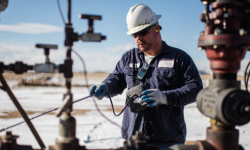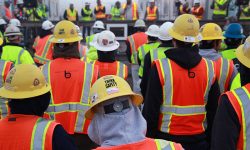Buildings constructed in Victoria after 2003 will no longer be forced to undergo mandatory asbestos checks, under controversial changes being proposed by the workplace regulator despite serious safety concerns.
The proposed reform, contained in a draft set of new regulations, comes just weeks after a recent string of health scares on Australian building sites where potentially deadly asbestos fibres have been discovered in materials imported from China.
WorkSafe's new proposal means Victorian builders would not need to audit for the presence of asbestos when refurbishing or demolishing structures built after December 2003 - the year the substance was outlawed from import and use.
The push has stirred division among the building industry, and asbestos support groups have likened it to "industrial manslaughter", in the wake of the troubling revelations that asbestos is continuing to slip into the country unintentionally, even with the ban in force.
A Perth hospital construction site went into lockdown last month after asbestos was found in Chinese roof panels. The supplier, Yuanda Australia, a subsidiary of Chinese manufacturing firm Yuanda Holdings, had also provided asbestos-ridden gaskets to a high-rise construction project in Brisbane.
And, in June, an investigation was launched into Adelaide company Australian Portable Camps over imports from China that illegally contained asbestos, prompting calls from Senator Nick Xenophon for a Senate inquiry.
In the wake of the asbestos discoveries, the Australian Border Force disclosed that it is only testing a small percentage of shipping containers each year for the deadly substance.
Leaked minutes of a recent WorkSafe meeting, obtained by Fairfax Media, reveal the regulator has sidelined warnings about the impact of establishing a cut-off date.
"Asbestos ... has been imported unintentionally, which is occurring when some building materials such as tiles are purchased from overseas," a union occupational safety expert told the meeting.
"Currently, if such materials are imported and the duty-holder is unsure it contains asbestos, they need to assume that asbestos is present or have the product tested ... By introducing a cut-off date, this safeguard is removed."
WorkSafe Victoria said the decision to include the draft reform was made after seeking submissions on asbestos management and other safety issues, as part of the process to modernise the legislation.
"WorkSafe has conducted a wide-ranging consultation process over the past two years with key stakeholders, including employer and union groups, in relation to a number of possible changes," a spokesman said.
"The public has until September 9 to comment on the suggestions and we welcome any feedback."
Developers in Victoria have been pressing the agency to introduce the December 2003 cut-off date for asbestos exemptions, saying the existing asbestos-testing requirements are unnecessary and burdensome.
"This is a pragmatic date for the cut-off given that no asbestos products have been authorised for manufacture/construction since then," Housing Industry Association regional director Gil King said.
"The focus should be on the higher risk period when asbestos products were more commonplace particularly in the '70s and '80s."
Under the proposed new regulation, the exemption for newer buildings would not apply in the event that asbestos has been already identified or is "likely to be present".
But Asbestos Disease Foundation of Australia president Barry Robson said WorkSafe's attempt to abolish the blanket requirement for all buildings to be asbestos-audited would be "bordering on industrial manslaughter".
"Is WorkSafe Victoria going to be a willing participant in the fourth wave of asbestos deaths here in Australia by removing this regulation?" he said.
"These bureaucrats obviously don't see people dying from asbestos diseases ... if they did, they wouldn't come up with these lame-brain ideas."
Building union officials said there was a real risk that workers exposed to cheap, foreign-made building products could be the next large group to suffer asbestos diseases in Australia, "but the problem is these diseases don't present themselves for decades".
Gerry Ayers, the CFMEU's head of health and safety, said asbestos fibres could cause asbestosis and the fatal disease mesothelioma.
"No one knows how much exposure is required to cause an asbestos-related disease, but it is a horrific way to die," Dr Ayers said.
"Why would you want to take the risk of exposing someone to this potentially deadly disease? It's very disappointing that the regulator is willing to take this chance and play the game of probability with someone's life."
Last week, in light of the recent asbestos scandals, federal Immigration Minister Peter Dutton said Australian builders were forced to "cut corners" and import cheap materials from China that risked containing asbestos because the CFMEU had been driving up the cost of doing business.
"There are a number of reasons that they're cutting corners; one is that they are being driven into the ground by the CFMEU and these other thugs … walking around on building sites," he told Sydney radio station 2GB.
The union's state secretary, John Setka, accused Mr Dutton of "making excuses" for ineffective border controls.
"At the same time as we have WorkSafe making grossly irresponsible recommendations, we have an incompetent Immigration Minister making excuses for Border Force's inability to halt the importation of asbestos contaminated products," he said.
The Housing Industry Association said it had "great concerns" about the importation of non-conforming building products, including products that have included asbestos and formaldehyde.
Asbestos fears as WorkSafe proposes a cut in mandatory checks by Nick Toscano. Available from <http://www.smh.com.au/business/workplace-relations/asbestos-fears-as-worksafe-proposes-a-cut-in-mandatory-checks-20160808-gqnea8.html>. [August 09, 2016]









